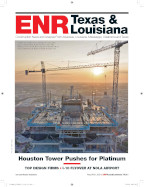TDI's regional revenue increased nearly $40 million in 2013, in part because "our offices are located in healthy markets," Kotubey says.
Nearly all of TDI's key market segments increased as well, including construction, service, building automation and facility services. "We've been able to leverage our construction and engineering expertise in the sports stadium, airport, health care and data center markets to take advantage of a number of great opportunities," he says.
Lean construction and integrated project delivery processes are coming into broader use across the region, Kotubey adds. "It's been growing on the East and West coasts and finally seems to be embraced in Texas," he says. "Fabrication and modularization also continue to grow."
Oil-and-gas development is also driving more work for concrete contractors, says Tom Ward, director of business development with Keystone Concrete Placement, Houston. The firm reported regional revenue of $240 million in 2013, an increase of more than $40 million over the previous year. Much of that growth came through its existing client base, Ward says.
Down the Line
Ward says 2014 and 2015 will continue to be solid for specialty contractors. "Many projects for our region have already been approved through 2015 and are in design," he says.
But specialty firm leaders say that doesn't mean the region isn't facing some problems.
"The industry lost 25% of our work force over the last seven years, and many companies are finding it difficult to refill the labor pipeline," Kotubey says. "This is leading to capacity issues."
He points to indications that some companies and markets are "sold out" of capacity, so prices may go higher or projects may have to be postponed or phased. Customers in some markets in South Texas are even reaching out well before their projects start to verify capacity in the marketplace, Kotubey says.
The need for better training adds another facet to the labor shortage. "I think the biggest challenge we see is the training of staff. The craft we can get to. We can train craft fairly quickly, but staff are the harder guys to train," Saucier says. "That's the guy who's going over your efficiency, your project controls and scheduling. That's a little more detailed, and you've got to have a little more experience in that. That's what leads your craft into being productive."










